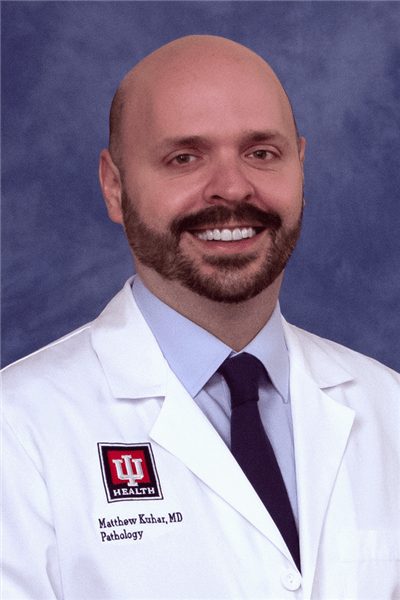
Matthew J. Kuhar, MD
Associate Professor of Clinical Pathology & Laboratory Medicine
Culbertson Scholar in Pathology & Laboratory Medicine
Associate Professor of Clinical Dermatology
Vice Chair of Education
Bio
Dr. Matthew Kuhar supports the Pathology Department’s numerous educational programs across the state of Indiana in his role as Vice Chair of Education. He works with leaders of each program to set strategic aims, remove barriers to success, and identify resources and best practices with the goal of improving educational outcomes and meeting the pathology workforce needs of Indiana and beyond.
Dr. Kuhar previously served the Pathology Residency Program Director for eight years. He is an Associate Professor of Pathology, Laboratory Medicine, and Dermatology; his clinical practice is devoted to Dermatopathology.
As a medical student at Drexel University, he received the Joel J. Roslyn MD award for “Outstanding Leadership while Demonstrating a Notable Level of Commitment and Service to His Fellow Students”. As a pathology resident at IUSM, he was the inaugural recipient of the department’s “Resident Award for Excellence in Teaching” in 2008, and again in 2009. He was the IUSM House Staff Forum President from 2006-2008. In 2018 he was awarded the IUSM “Trustee Teaching Award.”
Dr. Kuhar is active within IUSM more broadly. He has served on the Faculty Steering Committee, Diversity Council, Faculty Assembly, Teacher-Learner Advocacy Committee, System Lab Formulary Committee, Graduate Medical Education Committee, and as an inaugural member of the Graduate Medical Education Executive Committee. He has also served as the faculty advisor of the Alliance at IUSM student interest group and as the Medical Student Career Mentor for the Department of Pathology.
National service is a passion of his, and he is active in multiple organizations, especially those related to the accreditation of training programs, the certification of pathologists, and dermatopathology. Dr. Kuhar serves as Chair of the ACGME Review Committee for Pathology, which sets national accreditation requirements for pathology residency and fellowship programs, monitors program compliance with those standards, and renders accreditation decisions. He is co-author of the ACGME Dermatopathology 2.0 Milestones and is Chair of the ACGME's Pathology Program Requirement Major Revisions Writing Committee . He has served as a board examiner for the American Board of Pathology for Dermatopathology certification (2017-2022) and for Continuing Certification in Anatomic Pathology (2016-2023). Dr. Kuhar has contributed to reshaping life-long learning of pathology through his work on the ABPath Continuing Certification Advisory Committee. He has served on multiple committees of the American Society of Dermatopathology, and currently serves as their representative to the American Board of Pathology. At the United States and Canadian Academy of Pathology, he served as Chair their Resident Advisory Subcommittee and served on their Finance, Membership, and DEI Committees.
Key Publications
Google Scholar
Umphress B, Li A, Kuhar M, Kowal R, Alomari AK, Baldridge LA, Ross AJ, Warren SJ. NTRK fusions in xanthogranuloma, a clinicopathologic and molecular analysis of 23 cases. Am J Surg Pathol. 2025 Jul;49(7):639-645.
Umphress B, Kuhar M, Kowal R, Alomari AK, Baldridge LA, Ross AJ, Warren SJ. NTRK expression is common in xanthogranuloma and is associated with the solitary variant. J Cutan Pathol. 2023 Nov;50(11):991-1000.
Spandau DF, Chen R, Wargo J, Rohan C, Southern D, Zhang A, Loesch M, Weyerbacher J, Tholpady S, Lewis D, Kuhar M, Tsai KY, Kemp MG, Markey M, Cates E, Williams A, Knisely C, Bashir S, Gabbard R, Hoopes R, and Travers JB. Randomized controlled trial of fractionated laser resurfacing to aged skin as prophylaxis against actinic neoplasia. Journal of Clinical Investigation. 2021 Oct 1;131(19):e150972.
Hurst K, Bisbee EL, Parsons AC, Patel RM, North JP, Tse JY, Kuhar M, Plaza JA, Motaparthi K. Impact of the American Society of Dermatopathology Mentorship Awards Program. Journal of Cutaneous Pathology. 2021; 48(11):1432-1434.
Alrabadi N, Gibson N, Curless K, Cheng L, Kuhar M, Chen S, Warren SJP, Alomari AK. Detection of driver mutations in BRAF can aid in diagnosis and early treatment of dedifferentiated metastatic melanoma. Modern Pathology. 2019;32(3):330-337.
| Year | Degree | Institution |
|---|---|---|
| 2010 | Fellowship | Indiana University |
| 2009 | Residency | Indiana University |
| 2005 | MD | Drexel University |
| 2001 | BS | Gannon University |
Dermatopathology
Dermatopathology
Melanocytic proliferations
Inflammatory skin disorders
Desc: Trustees' Teaching Award
Scope: School
Date: 2018-05-01
Desc: Resident Award for Excellence in Teaching
Scope: Department
Date: 2009-06-19
Desc: Resident Award for Excellence in Teaching
Scope: Department
Date: 2008-06-20
Desc: Joel J Roslyn Award for Outstanding Leadership
Scope: School
Date: 2005-05-18
Desc: Richard Shuman Award for Excellence in Pathology and Lab Medicine
Scope: Department
Date: 2005-05-18
